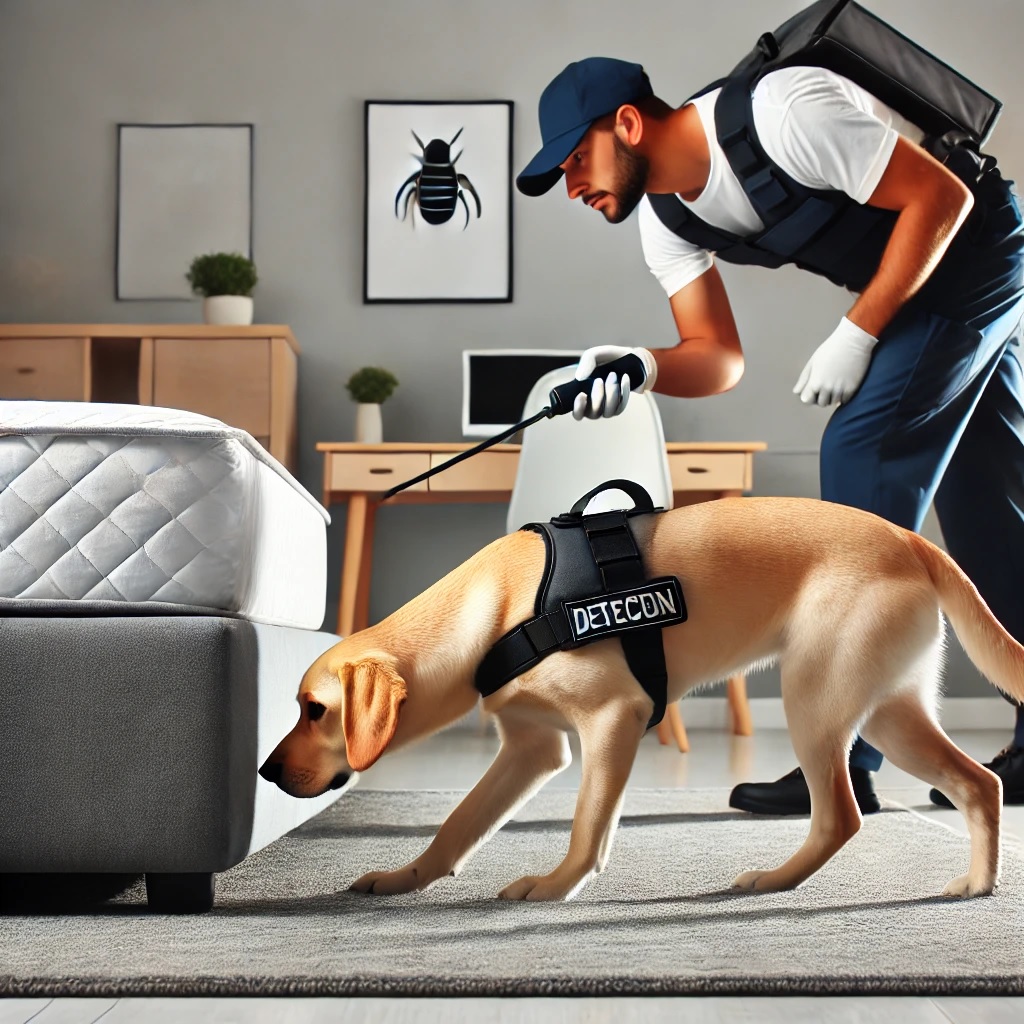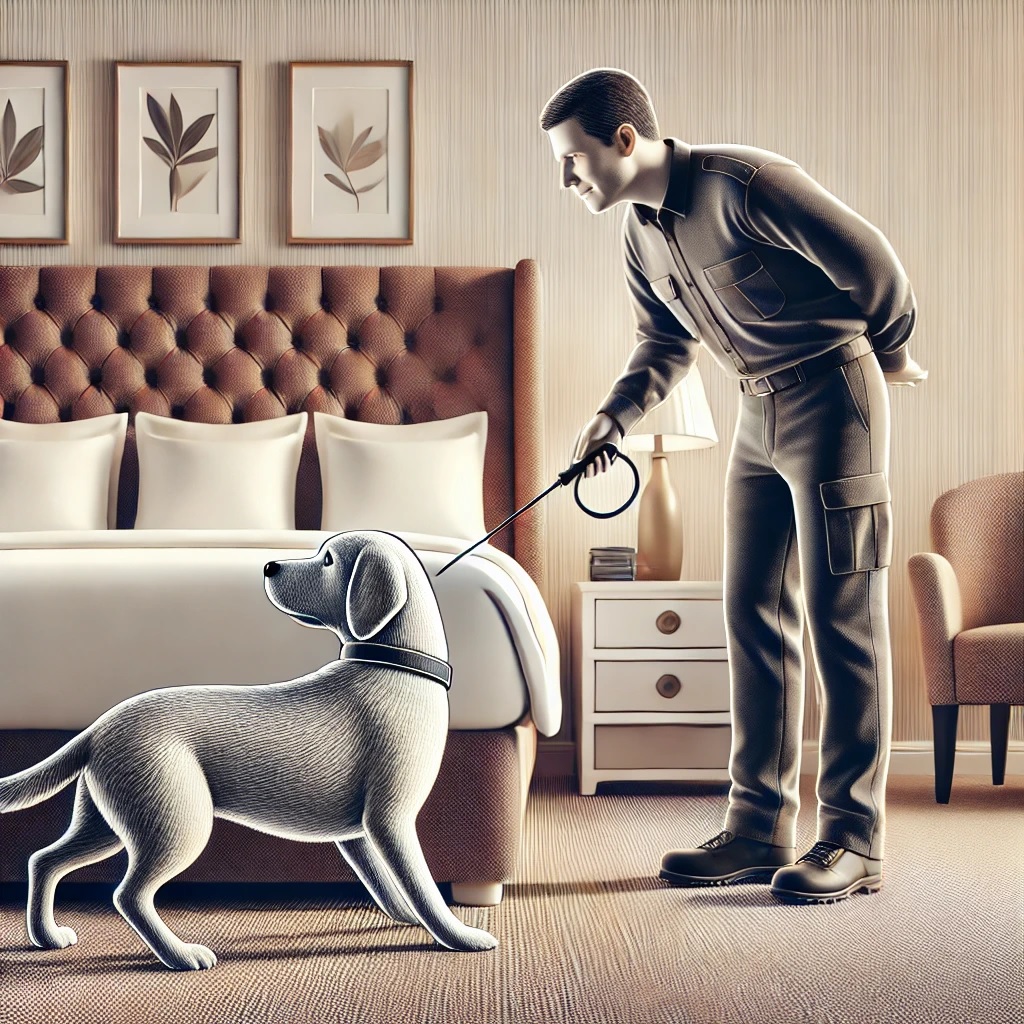By ThermoPest – Your Local Pest Control Experts
When it comes to finding bed bugs, we humans sometimes miss the mark. But for dogs, with their incredible sense of smell, it’s a whole different story. Dogs have become a key part of bed bug detection, and their ability to sniff out these pests, even in the tiniest nooks and crannies, is nothing short of amazing. But, of course, it’s not just a matter of having a dog around. These pups need specialised training to ensure they can detect bed bugs quickly and accurately.
So, how do you go about training a dog to detect bed bugs? Let’s walk through the process, from the basics to advanced training techniques.

Before we get into the training details, it’s worth taking a moment to understand why dogs are so effective at detecting bed bugs. Dogs have a sense of smell that’s up to 100,000 times more powerful than ours. Where humans might struggle to spot the tiny signs of an infestation, dogs can pinpoint the exact location of bed bugs—whether they’re hiding in a mattress seam, behind a skirting board, or deep in your carpet.
They’re quick too. A well-trained dog can cover a room in minutes, checking all the likely (and unlikely) hiding spots for these pests. And because they’re able to detect even small infestations, they can help nip the problem in the bud before it spirals out of control.
Training a dog to detect bed bugs is all about harnessing their natural talent for sniffing things out. But not every dog is cut out for the job. The first step is choosing the right breed. Breeds like Beagles, Labradors, and German Shepherds are often favoured for detection work because of their sharp noses, work ethic, and high energy levels.
Once the right dog is selected, the training begins. At first, it’s all about introducing the dog to the scent of live bed bugs. This is done by exposing the dog to samples of live bed bugs (safely contained, of course) and rewarding them with treats or toys whenever they show interest in the scent. It’s classic reward-based training—dogs quickly learn that finding the smell of bed bugs leads to good things!
As the dog becomes more familiar with the scent, the training ramps up. Now it’s about fine-tuning their ability to detect bed bugs in real-world environments. This means teaching them to ignore other household scents and focus solely on bed bugs. It’s not enough for the dog to find any old bug—they need to find live bed bugs specifically, ignoring other insects, dust, and debris that might distract them.
Dogs are trained in various environments to mimic the kinds of places they’ll be working in—homes, hotels, offices, you name it. It’s crucial that they can work effectively in different settings, as infestations can pop up anywhere. The dog is also regularly tested to make sure they can still reliably detect bed bugs in challenging scenarios.
Just like humans, dogs need to keep their skills sharp. After completing their initial training, they continue to undergo regular refresher courses to maintain their detection accuracy. Ongoing training helps ensure that they stay focused and don’t start giving false positives (alerting to the presence of bed bugs when none are there).
Health is another important factor. A healthy dog is a sharp dog, so regular vet checks, exercise, and a balanced diet are essential for keeping a detection dog in top condition. A happy, healthy dog is not only more efficient but also more motivated to perform well during searches.
Of course, training bed bug detection dogs isn’t without its challenges. One common issue is distractions. A dog in training might get sidetracked by other smells, noises, or movements, particularly in busy environments. Over time, with patience and consistent reinforcement, these distractions can be minimised, and the dog learns to stay focused on the task.
Another challenge is ensuring the dog can differentiate between live bed bugs and dead ones, as well as their eggs. The goal is for the dog to alert only when live bed bugs are present, as dead bugs or remnants don’t pose the same immediate problem. This level of precision requires consistent training and testing.
Lastly, the relationship between the dog and its handler is key. It’s not just about the dog’s ability—there needs to be a strong bond of trust and communication between the two. The handler plays an important role in interpreting the dog’s signals and guiding them during inspections. This teamwork is crucial for effective detection.
When dogs are integrated into professional pest control services, they can transform the way bed bugs are detected and eliminated. At ThermoPest, we know the value of using trained detection dogs alongside other pest control methods. A dog’s ability to quickly and accurately locate an infestation can make the treatment process far more efficient, saving time and ensuring thorough extermination.
There have been countless success stories where bed bug detection dogs have saved the day. In one instance, a hotel had experienced complaints of bed bugs but couldn’t locate the source. A detection dog quickly found the pests hiding in an area that had been overlooked during human inspections, saving the hotel from further damage to its reputation and preventing the infestation from spreading.

As bed bugs continue to be a persistent issue, the role of detection dogs is only growing. Their incredible noses and quick work make them an invaluable asset in the fight against infestations. As technology and training methods evolve, so too will the efficiency of canine detection teams.
At ThermoPest, we’re committed to staying ahead of the curve when it comes to bed bug detection and control. Whether you’re facing a full-blown infestation or just want peace of mind, trained detection dogs are an important part of the solution. Let’s tackle the bed bugs before they tackle you!